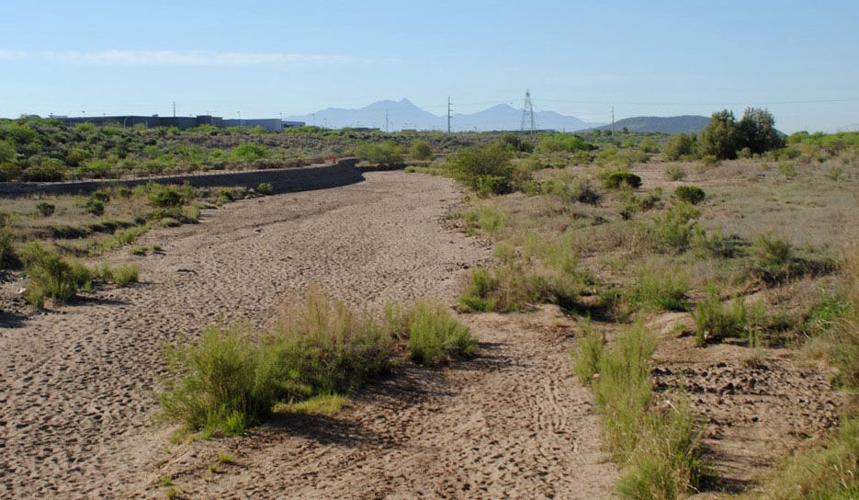NOGALES, Ariz. т Nogales, УлшжжБВЅ, and Nogales, Sonora, share something more meaningful than their city name. They also share a source of water that is vital to their region of the border.
Officials from Sonora and УлшжжБВЅ say binational water cooperation is essential to their survival and growth. Both also acknowledge the relationship related to water and the issues involved.
тWe know that УлшжжБВЅ wouldnтt be УлшжжБВЅ without water, probably our most precious resource,т said УлшжжБВЅ Secretary of State Michele Reagan. тPeople donтt realize that things are grown in other countries.т
Border towns commonly share water resources. In this case, both cities share the Santa Cruz River. At 184 miles in length, it flows from УлшжжБВЅ to Sonora and back into УлшжжБВЅ.
One organization that works to promote water cooperation between the two countries is the Sonoran Institute. Its CEO, Stephanie Sklar, says binational cooperation around water is essential and that the Sonoran Institute works with lawmakers to promote it.
People are also reading…
тThereтs nowhere that we work that we are not dependent upon what is happening to a river or range of rivers that are providing sustenance to communities,т Sklar said.
Politicians from both sides of the border said they acknowledge that most of the issues related to water have originated on the Mexican side of the river.
тWe are doing our part regarding water research with not only the water that comes through Nogales but the water that comes through the Santa Cruz,т said Sonoran Secretary of State Miguel Pompa. тThat way the contaminated water does not come down to this side. We are working on that.т
Pompa said that local, state, and federal governments in Mexico are cooperating to create a first-of-its-kind solar water-treatment plant in Sonora. Water treatment on the Santa Cruz is done in the U.S.
тWhat we are currently doing т and it is working т is treating the residual water in Nogales and sending clean water into the U.S.,т said Esteban Martinez, a city councilman from Nogales, Sonora.
Pompa also said that federal governments on both sides are to blame for most of the issues pertaining to water in that тWashington and Mexico City donтt understand the border because they arenтt on the border.т
Echoing Pompa, Sklar also said she hopes federal politicians minimize interference with water around the border.
тI would like to not be distracted from what we do by politics taking the front seat,т she said. тWeтre very connected to the land in the West and we are very connected to our natural resources. That is something that I think transcends politics тІ a river canтt be healthy on one side and not healthy on the other.т
Nogales, УлшжжБВЅ, Mayor John F. Doyle said he commonly deals with issues related to mishandling of water on the Mexican side. He said factories in Sonora dump toxic waste into shared waterways.
He added that drug cartels commonly use the sewers that run under the border wall to transport bundles of narcotics. These bundles have become dams in the waterways, which lead to infrastructure problems such as blocked pipes and overflowing sewers.
тWhat we want to see is that (the Sonoran government is) more on top of things and that the revelations donтt just come from this side,т Doyle said. тIf not, we end up dealing with this problem here.т
Many factories in Sonora are owned by American companies. Under the NAFTA agreement, their waste is to be treated by American plants.
Gilbert Anaya, an environmental engineer with the International Boundary and Water Commission (IBWC), said he focuses on educating factories in Sonora in order to combat some of the water pollution issues.
International wastewater treatment is handled by the IBWC plant . It treats about 9.9 million gallons of water from Mexico a day.
тThe goal is to educate them and say donтt do it this way, and if you have waste that you need to dispose of, you need to know who to call,т Anaya said. тYou arenтt going to get in trouble for calling and asking for help. You canтt get rid of any waste without doing it properly.т
Anaya said some of these American-owned factories, also known as maquiladoras, contract to smaller local Mexican companies which can lead to miscommunication and improper treatment of waste.
тYouтre shooting yourself in the foot; youтre going to hurt yourself and everybody else if you donтt treat your waste properly,т Anaya said.
Recently leaders from both countries met to discuss issues pertaining to water cooperation. Doyle and other lawmakers, politicians, and business people from Sonora and УлшжжБВЅ gathered in Nogales, УлшжжБВЅ, to discuss the economic growth in the border region. The panel consisted of Reagan, Pompa and Doyle, who brought up water issues related to agriculture.
тPeople donтt realize that the food they buy isnтt grown here (in УлшжжБВЅ),т Reagan said. т(It) is one of the biggest things I was surprised by coming down here.т










